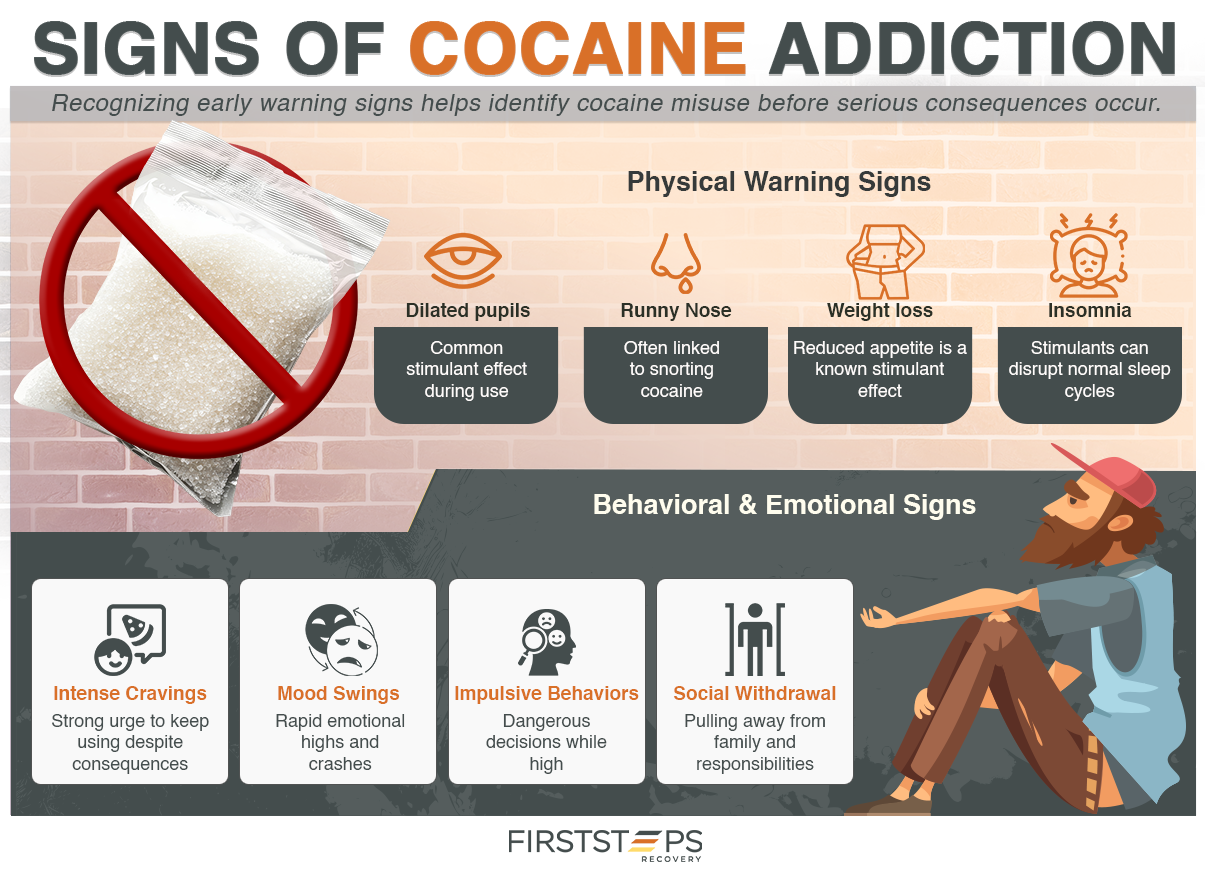Cocaine addiction is a growing concern in California. The rising number of individuals struggling with cocaine addiction poses significant health risks and negatively impacts their personal and professional lives.
This issue extends beyond the individuals directly involved, affecting families, friends, and the wider community. Family members often experience emotional and psychological stress, making their involvement in the treatment process (such as with family therapy) crucial for healing and recovery.
At First Steps Recovery in Fresno County, our facility boasts experienced professionals who possess a deep understanding of the complexities associated with cocaine addiction. Care is provided by licensed medical professionals experienced in addiction care. Individuals receive personalized attention with tailored treatment plans to address their unique needs and circumstances. Each individual’s treatment plan is developed to guide all aspects of their recovery, including therapy and aftercare.
Our facilities offer a comprehensive range of services, including detoxification, addiction-focused therapy, and ongoing support, to ensure holistic care throughout the recovery process. As a rehab center, we provide a supportive, clinical environment for cocaine addiction recovery that integrates detox, therapy, family involvement, and community support as essential parts of the rehabilitation process.

Cocaine addiction, also known as cocaine use disorder, is a chronic and compulsive pattern of cocaine use that leads to physical, psychological, and social problems. Cocaine is a strong stimulant that is created using the leaves of the coca plant found in South America. As a drug, cocaine appears as a white powder that dealers often cut with other drugs (such as amphetamines) to increase profits.
Cocaine is known for its euphoric effects and the temporary increase in energy, alertness, and sociability it can induce. The brain is affected by cocaine because the drug increases the amount of dopamine, a reward chemical found within the brain. This reinforces drug-taking behaviors. As drug use continues, the brain becomes less sensitive to cocaine and creates less dopamine. In turn, users must ingest more of the drug to feel the same effects.
Over time, cocaine use can cause nausea, high blood pressure, tremors or twitches, restlessness, an increased heartbeat, and a number of other issues, depending on the method of ingestion. Withdrawal symptoms can be severe. Professional withdrawal management is essential to safely address these symptoms and support recovery.

Recognizing the signs of cocaine addiction involves observing a combination of physical, behavioral, and psychological indicators. The presence of one or more of these signs does not necessarily confirm addiction, but a combination of several may indicate a potential problem.
Identifying these indicators at an early stage enables prompt intervention and assistance. If you suspect someone is struggling with cocaine addiction, encourage them to seek professional help. Early action can make a significant difference in a loved one’s life.
Treatment for cocaine addiction typically involves a combination of therapies and medications to help individuals overcome their addiction and achieve long-term recovery. The treatment approach may differ based on the individual’s requirements and the extent of their addiction.
One commonly used approach in cocaine addiction treatment is cognitive-behavioral therapy (CBT). CBT assists individuals in recognizing and changing negative thought patterns and behaviors linked to addiction. It also helps develop coping skills to prevent relapse and manage cravings. Experiential therapy is also offered as part of a comprehensive therapeutic program, providing hands-on, activity-based interventions that facilitate healing and personal growth.
There are currently no approved medications specifically for treating cocaine addiction, but certain antidepressants and anti-seizure medications may be used to manage withdrawal symptoms and cravings. For individuals with co-occurring mental health conditions, medication management services are an important part of treatment. It is overseen by the clinical team to ensure safe and effective use. Nursing staff play a vital role in monitoring residents’ health, supporting the detox and treatment process, and providing compassionate care throughout recovery.
In instances of severe cocaine addiction, professionals often suggest residential treatment at an addiction treatment center. These programs offer around-the-clock medical supervision and intensive therapy in a residential environment. Our facilities provide specialized residential treatment for cocaine addiction, emphasizing long-term recovery. Outpatient programs are also available, offering similar therapies but allowing individuals to continue living at home and maintain their daily responsibilities.
We are committed to ongoing rehabilitation, providing structured addiction treatment support and resources to promote long-term sobriety and healing beyond the initial treatment phase. Aftercare planning is crucial, ensuring continued support and relapse prevention after initial treatment is completed. Regular review of each individual’s treatment plan and progress ensures that the most effective rehabilitation strategies are being used for sustained recovery.
Recognizing the need for cocaine detox and seeking assistance from a specialized cocaine treatment center is crucial for overcoming addiction and achieving lasting recovery. A professional assessment is the first step in determining whether cocaine detox is appropriate for an individual. If you’re unsure whether cocaine detox may be right for you, consider the following signs:

At First Steps Recovery, you’ll receive thorough care to help overcome substance use disorder. The detox process is supervised to manage physical and psychological withdrawal symptoms. These symptoms vary in severity and can be a challenge, so programs like detox and cocaine addiction treatment programs are essential for a successful recovery.
During acute withdrawal, individuals will begin to experience uncomfortable symptoms as a result of the drug leaving their bodies. Acute cocaine withdrawal symptoms can be both physical and psychological. They can start shortly after stopping cocaine use, and the severity of the symptoms will depend on the length of time a person has been using cocaine.
Physical withdrawal symptoms include fatigue, restlessness, tremors, aches and pains, and chills. Psychological symptoms of withdrawal include a lack of pleasure, anxiety and depression, nightmares, paranoia, agitation, and irritability.
After the acute withdrawal phase of detoxification is over, most of the physical symptoms of cocaine withdrawal will stop. Psychological symptoms may continue, and individuals may begin experiencing cravings for the drug. These cravings can be very difficult to cope with, especially without support, which is what makes detoxification so important. The early abstinence phase may last longer than the acute withdrawal stage.
Individuals in the protracted abstinence stage of treatment often report feeling more clear-headed. They can recognize triggers more appropriately, and their cravings are more sporadic in nature. During this phase, individuals can focus entirely on their treatment and learn various valuable skills that will aid in maintaining sobriety even after leaving the treatment program. The detox process varies for everyone, and the duration a person can anticipate spending detoxing from cocaine will depend on their history with the drug.
The duration of cocaine detoxification varies for each recovery journey. It’s influenced by factors such as the extent of cocaine use, overall health, and individual differences in metabolism. Typically, the acute withdrawal phase (where most physical symptoms occur) lasts about one to two weeks. However, psychological symptoms like cravings and mood disturbances may persist for an extended period.
It’s essential to note that detox is just the initial step in overcoming drug addiction. Comprehensive treatment, which may include experiential therapy, counseling, and other forms of support, is crucial for addressing the underlying issues and promoting long-term recovery. The specific timeframe for detox and the overall recovery process should be discussed with healthcare professionals, who can provide personalized guidance based on individual circumstances.
Choosing help for drug abuse, especially with cocaine, is tough but vital. At First Steps Recovery, we’re here to guide you to a fresh start. Opting for treatment is a transformative decision, offering a path to healing. Whether you’re dealing with an addiction to cocaine, alcohol, or other substances, we’re here to treat you and your family for substance abuse.
We’re ready to support you on this journey towards a healthier life. All inquiries and treatment at our center are completely confidential, so you can reach out with peace of mind. Take the courageous step; help is here for you. Contact us today to learn more.

From our certified therapists and nurses to our emotional support animal "Cooper", our entire team is dedicated to the health and success of our clients throughout our program and beyond.
Have questions about how our treatment programs works? Let's talk.
Experience the benefits of our alcohol detox treatment at First Steps Recovery.
First Steps Recovery can help you find lasting sobriety from benzodiazepines.
Fentanyl is one of the most common causes of drug overdose in the United States today. Help end your addiction with First Steps Recovery.
When you're ready to end your methamphetamine addiction, we're here for you at First Steps Recovery.
Have questions about our substance abuse treatment programs? Let’s talk.
Dayatra L.
Melissa B.
Bruce G.
Have questions about how our alumni program works? Let's talk.










Have questions about First Steps Recovery? We're here to help.
© Copyright 2023 • First Steps Recovery • All Rights Reserved